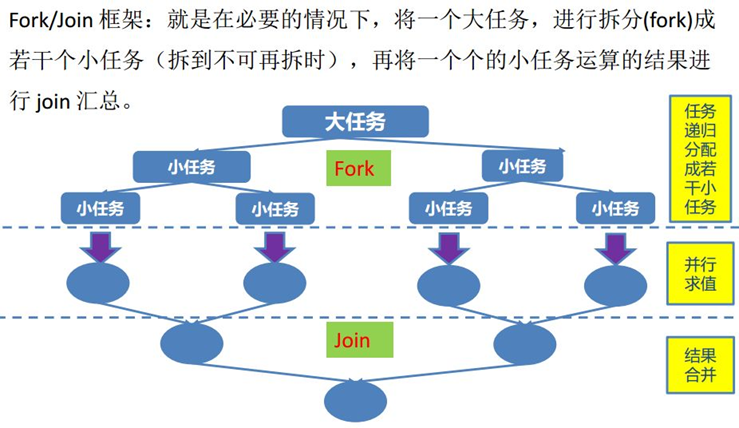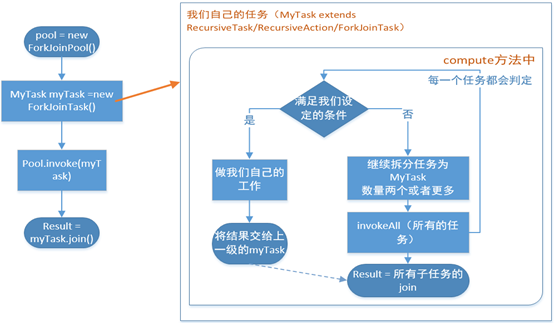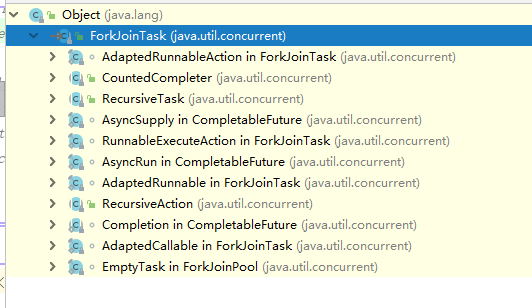1.Fork-Join
1.1 分而治之的设计思想:
将一个难以直接解决的大问题,分割成一些规模较小的相同问题,以便各个击破,分而治之。
分治策略:
对于一个规模为n的问题,若该问题可以解决,则直接解决,否则将其分解为K个模块较小的子问题,这些子问题相互独立且与原问题形式相同(子问题相互之间有管理就变成了动态规范算法),递归的解决浙西子问题,然后将子问题的解 合并得到原问题的解。
1.2 Fork/Join框架:

工作密取:
在“生产者—消费者”模式中,生产者和消费者共享一个队列,而在工作密取的情境中,每个消费者都有一个双端队列,在消费者完成了自己队列中的工作时,可以去其他消费者队列的队尾取来工作,而并不会干扰其他消费者的工作。在工作密取情境中,消费者从自己队列的队头取自己的工作,从其他消费者的队尾取别人的工作来完成。
工作密取非常适合于消费者同时也是生产者的情形,当消费者执行工作时发现有更多的工作要做,则可以将这些工作放到自己队列的末尾,也可以送到其他消费者队列的队尾;当自己队列没有工作要做时,可以去其他消费者队列取工作来完成,这样每个消费者都会保持忙碌的状态。
ForkJoinPool中维护着多个线程(一般为CPU核数)在不断地执行Task,每个线程除了执行自己职务内的Task之外,还会根据自己工作线程的闲置情况去获取其他繁忙的工作线程的Task,如此一来就能能够减少线程阻塞或是闲置的时间,提高CPU利用率。
1.3 Fork/Join使用的标准范式

ForkJoinPool pool = new ForkJoinPool(); MyTask myTask = new MyTask(); pool.invoke(myTask); result = myTask.join();
=================================================
//invoke方法:
public <T> T invoke(ForkJoinTask<T> task) {
if (task == null)
throw new NullPointerException();
externalPush(task);
return task.join();
}
MyTask为我们自己的任务 可继承自

其中常用的有:
1)RecursiveAction ,用于没有返回结果的任务
2)RecursiveTask<V> , 用于有返回结果的任务
Task要通过ForkJoinPool来执行,使用submit 或 invoke 提交,两者的区别是:invoke是同步执行,调用之后需要等待任务完成,才能执行后面的代码;submit(有返回值) ,execute(无返回值) 是异步执行。

Task提交后完成后 可以通过task的join()和 get()方法获得返回结果
在我们自己实现的compute方法里,首先需要判断任务是否足够小,如果足够小就直接执行任务。如果不足够小,就必须分割成两个子任务,每个子任务在调用invokeAll方法时,又会进入compute方法,看看当前子任务是否需要继续分割成孙任务,如果不需要继续分割,则执行当前子任务并返回结果。使用join方法会等待子任务执行完并得到其结果。
get():等待任务执行完成,并返回计算结果
如果当前线程是ForkJoinWorkerThread,调用doJoin方法获取结果
如果当前线程不是ForkerJoinWorkerThread,调用externalInterruptibleAwaitDone方法。
任务执行完成返回后,如果任务完成状态是CANCELLED,抛出CancellationException异常。如果任务完成状态是EXCEPTIONAL,将任务执行过程中抛出的异常包装成ExecutionExcepiton重新抛出。
ForkJoinTask的几种任务状态
volatile int status; // accessed directly by pool and workers
static final int DONE_MASK = 0xf0000000; // mask out non-completion bits
static final int NORMAL = 0xf0000000; // must be negative //已完成
static final int CANCELLED = 0xc0000000; // must be < NORMAL //被取消
static final int EXCEPTIONAL = 0x80000000; // must be < CANCELLED //出现异常
static final int SIGNAL = 0x00010000; // must be >= 1 << 16 //信号
static final int SMASK = 0x0000ffff; // short bits for tags
/** * Waits if necessary for the computation to complete, and then * retrieves its result. * * @return the computed result * @throws CancellationException if the computation was cancelled * @throws ExecutionException if the computation threw an * exception * @throws InterruptedException if the current thread is not a * member of a ForkJoinPool and was interrupted while waiting */ public final V get() throws InterruptedException, ExecutionException { int s = (Thread.currentThread() instanceof ForkJoinWorkerThread) ? doJoin() : externalInterruptibleAwaitDone(); Throwable ex; if ((s &= DONE_MASK) == CANCELLED) throw new CancellationException(); if (s == EXCEPTIONAL && (ex = getThrowableException()) != null) throw new ExecutionException(ex); return getRawResult(); }
/**
* Implementation for join, get, quietlyJoin. Directly handles
* only cases of already-completed, external wait, and
* unfork+exec. Others are relayed to ForkJoinPool.awaitJoin.
*
* @return status upon completion
*/
private int doJoin() {
int s; Thread t; ForkJoinWorkerThread wt; ForkJoinPool.WorkQueue w;
return (s = status) < 0 ? s :
((t = Thread.currentThread()) instanceof ForkJoinWorkerThread) ?
(w = (wt = (ForkJoinWorkerThread)t).workQueue).
tryUnpush(this) && (s = doExec()) < 0 ? s :
wt.pool.awaitJoin(w, this, 0L) :
externalAwaitDone();
}
/**
* Implementation for invoke, quietlyInvoke.
*
* @return status upon completion
*/
private int doInvoke() {
int s; Thread t; ForkJoinWorkerThread wt;
return (s = doExec()) < 0 ? s :
((t = Thread.currentThread()) instanceof ForkJoinWorkerThread) ?
(wt = (ForkJoinWorkerThread)t).pool.
awaitJoin(wt.workQueue, this, 0L) :
externalAwaitDone();
}
join():阻塞当前线程并等待获取结果,得到结果正常则返回值,得到结果异常 则抛出异常!
/** * Returns the result of the computation when it {@link #isDone is * done}. This method differs from {@link #get()} in that * abnormal completion results in {@code RuntimeException} or * {@code Error}, not {@code ExecutionException}, and that * interrupts of the calling thread do <em>not</em> cause the * method to abruptly return by throwing {@code * InterruptedException}. * * @return the computed result */ public final V join() { int s; if ((s = doJoin() & DONE_MASK) != NORMAL) reportException(s); return getRawResult(); }
pool.invoke() 本身也是调用了task.join() 可以返回结果
task.invok() 与task.join()类似 只不过调用的是doInvoke() 而非doJoin()